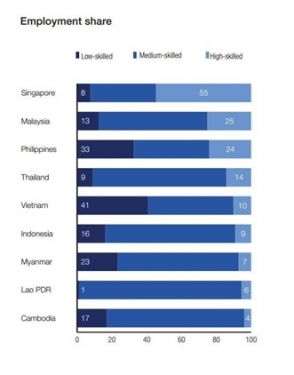From Davos to Asia: Future Jobs & Asia’s Growing Skills Gap
Some see it as a plague while others as an opportunity—either way, the Fourth Industrial Revolution will impact all industries, economies, and society at large. Also known as Industry 4.0, this revolution is marked by “a fusion of technologies that is blurring the lines between the physical, digital, and biological spheres.” Unlike previous industrial transformations, 4.0 is happening at a higher speed, indiscriminately disrupts across industries and economies, and will likely reconstruct entire systems. How will companies adapt to this accelerated rate of technological change? How will business ensure they can access the right talent in an ever-evolving landscape of skills? Given the magnitude of this impending change, the Fourth Industrial Revolution took center stage at last week’s Davos Summit. Global leaders from the private and public sector highlighted various noteworthy contextual barriers and potential solutions that companies should be aware of.
In the Asian context, a widening skills gap is becoming a growing challenge. Low-skilled, affordable labour historically propelled companies in the region, however, Asian businesses are increasingly depending on higher-skilled labour instead. Such high-skilled workers are difficult to find in most Asian countries. Though country level differences exist, there are various underlying communalities exacerbating the skills gap issue in the region:

+ Students in higher education are studying topics that are less relevant instead of critical STEM subjects.
+ Teachers are not properly trained to teach STEM.
+ An estimated 65 percent of the children entering primary schools are going to work in a job that currently does not exist, which makes curriculum development problematic.
+ There are educational and workforce participation barriers to women and girls. These persistent gaps are determinants of higher youth workforce inactivity rates with some of the highest levels in south and east Asia. Malaysia (41%), followed by Indonesia (38%) and the Philippines (35%) are experiencing the highest workforce participation gender gap in Asia.
+ Investing in early education is not a government priority and students that fall behind at this early stage, typically from poor and vulnerable backgrounds, are unable to catch up.
These challenges ripple through educational systems and governments to eventually funnel unskilled workers into a company’s talent pool. Consequently, many companies must rely on outsourcing to foreigners. Such short-term approaches can temporarily bridge the gap, but to be a sustainable company requires developing a strategy to successfully adapt to Industry 4.0.
Global leaders came together at the Davos 2019 to share solutions on how to strategically manage talent issues. There exist both individual as well as collaborative approaches that include:
- Providing self-learning opportunities to employees to reskill through online modules and training courses. As emphasised by Alain Dehaze (CEO at Adecco Group), companies must switch mindsets and view investing in upskilling and reskilling as a monetisation instead of a cost.
- Creating remote work or telecommuting options to spread employability beyond urbanized areas.
- Providing intra-regional job placement opportunities to staff.
- Collaborating with educational institutions to expose students to workplace skills.
- Partnering with training providers (both public and private) to create demand-driven training.
- Developing programs to facilitate the transition from education to employment.
- Developing cross-regional qualification systems within industries.
- Developing cross-industry training.
- Identifying partners that allow the business to contribute to curricula reform.
Christine Lagarde (Managing Director of the International Monetary Fund) highlighted the gravity of unemployment rates, and how these will be exacerbated by Industry 4.0, by sharing that, “Indian Railways announced 60,000 jobs and 20 million applied.” The Fourth Industrial Revolution will serve as a catalyst to create new jobs while displacing others. Business have an important role to play to ensure their workers’ skills stay relevant.
